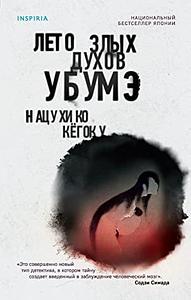Take a photo of a barcode or cover
challenging
dark
emotional
mysterious
sad
tense
medium-paced
Plot or Character Driven:
A mix
Strong character development:
Complicated
Loveable characters:
Yes
Diverse cast of characters:
Yes
Flaws of characters a main focus:
Complicated
Recuérdenme hacerle una reseña más elaborada cuando logre recuperarme. Por ahora, quiero decir que estoy encantado con la obra, su lore y temática enciclopédica, aunque me detuvo un poco su desarrollo.
___________________
Bueno, ahora sí la reseña. Solamente porque no quería acabar el año dejando incompleta esta tarea pendiente. ¿Qué decir de El Verano de la Ubume? Una novela que no esperaba me termina enganchando como lo hizo. Conociéndome a mí y mi ingrato trato con los libros que kindle me dice tardaré más de cinco horas en terminar de leer. Lo elegí sin embargo por mi interés siempre primordial hacia la cultura y folklore de Japón, especialmente cuando involucramos atmósferas terrrorífics y grotescas. La obra ofrece esta mirada, pero aún así hay más por desenmarañar. Tal es el choque entre este país entrando a la modernidad que las concepciones fantásticas solo sirven para enmascarar sucesos reales quizá más perturbadores que los de la tradición oral. Para determinar la tesis de la obra hay que plantearse todo el sistema de creencias niponas y trasladarlas a la razón ya predominante en su gente. ¿Cómo se explica entonces un fenómeno como el de las manifestaciones de las mujeres muertas en el parto aterrando a la gente en las noches con el llano de un bebé? ¿Cómo se explican laas desapariciones, los sucesos antinaturales y los lapsos borrados de la memoria?
Nantsuhiko Kyogoku presenta una historia dinámica y descriptiva sobre un caso detectivesco que aparenta esa capa de fantasía rural pero esconde tras de sí los (err/horr)ores de la razón y el cálculo que recaen sobre los personajes. Bajo la ingenuidad triste del protagonista, Sekyguchi. nosotros también como lectores somos guiados por una espiral de misterio que envuelve la trama principal. Una mujer embarazada más de 20 meses, su esposo desaparecido, una macabra relación pasada con el sitio de donde provienen. La voz de Kyogokudo sirve para alumbrar algo del misterio, a la vez que mediante sus discusiones parten diálogos que afloran las temáticas y relaciones necesarias para entender la intención del autor (la novela inicia con uno muy extenso pero espectacular). Ryoko y Kyoko tanto componen el ideal de la datura: la belleza impenetrable y destructora. Los demás personajes componen un arquetipo preciso para disponer el valor de la obra. Es una novela de la que se puede sacar tantas conclusiones y temas que es interesante leerla a cada instante y aprendes más de lo esperado.
Quizá, como dije, las sobreexplicaciones no calaron en mí lo suficiente, y el desarrollo de los hecho prometía más que la resolución. Pero como asiduo fan del género y la temática, no puedo más que sentirme satisfecho. Casi favorita.
La música de Sigur Rós, Tim Hecker y Lalleshwari acompañaron.
___________________
Bueno, ahora sí la reseña. Solamente porque no quería acabar el año dejando incompleta esta tarea pendiente. ¿Qué decir de El Verano de la Ubume? Una novela que no esperaba me termina enganchando como lo hizo. Conociéndome a mí y mi ingrato trato con los libros que kindle me dice tardaré más de cinco horas en terminar de leer. Lo elegí sin embargo por mi interés siempre primordial hacia la cultura y folklore de Japón, especialmente cuando involucramos atmósferas terrrorífics y grotescas. La obra ofrece esta mirada, pero aún así hay más por desenmarañar. Tal es el choque entre este país entrando a la modernidad que las concepciones fantásticas solo sirven para enmascarar sucesos reales quizá más perturbadores que los de la tradición oral. Para determinar la tesis de la obra hay que plantearse todo el sistema de creencias niponas y trasladarlas a la razón ya predominante en su gente. ¿Cómo se explica entonces un fenómeno como el de las manifestaciones de las mujeres muertas en el parto aterrando a la gente en las noches con el llano de un bebé? ¿Cómo se explican laas desapariciones, los sucesos antinaturales y los lapsos borrados de la memoria?
Nantsuhiko Kyogoku presenta una historia dinámica y descriptiva sobre un caso detectivesco que aparenta esa capa de fantasía rural pero esconde tras de sí los (err/horr)ores de la razón y el cálculo que recaen sobre los personajes. Bajo la ingenuidad triste del protagonista, Sekyguchi. nosotros también como lectores somos guiados por una espiral de misterio que envuelve la trama principal. Una mujer embarazada más de 20 meses, su esposo desaparecido, una macabra relación pasada con el sitio de donde provienen. La voz de Kyogokudo sirve para alumbrar algo del misterio, a la vez que mediante sus discusiones parten diálogos que afloran las temáticas y relaciones necesarias para entender la intención del autor (la novela inicia con uno muy extenso pero espectacular). Ryoko y Kyoko tanto componen el ideal de la datura: la belleza impenetrable y destructora. Los demás personajes componen un arquetipo preciso para disponer el valor de la obra. Es una novela de la que se puede sacar tantas conclusiones y temas que es interesante leerla a cada instante y aprendes más de lo esperado.
Quizá, como dije, las sobreexplicaciones no calaron en mí lo suficiente, y el desarrollo de los hecho prometía más que la resolución. Pero como asiduo fan del género y la temática, no puedo más que sentirme satisfecho. Casi favorita.
La música de Sigur Rós, Tim Hecker y Lalleshwari acompañaron.
Graphic: Panic attacks/disorders, Violence, Murder, Pregnancy
Moderate: Body horror, Sexual content, Toxic relationship, Blood, Medical content, Schizophrenia/Psychosis
Minor: Confinement, Cursing, Drug use, Emotional abuse, Infidelity, Misogyny
dark
emotional
mysterious
reflective
medium-paced
Plot or Character Driven:
A mix
Strong character development:
Complicated
Loveable characters:
Complicated
Diverse cast of characters:
Complicated
Flaws of characters a main focus:
Yes
Maybe next year, I couldn't focus long enough to get to the story and I need to return this book to the library. I definitely want to finish it :(
challenging
dark
mysterious
sad
tense
slow-paced
Plot or Character Driven:
A mix
Strong character development:
N/A
Loveable characters:
Complicated
Diverse cast of characters:
N/A
Flaws of characters a main focus:
Complicated
Needs a lot of concentration, and the chapters were too long for my liking but after about 100 pages I was drawn in and needed to know what happens. A fascinating book
Story: 5 / 10
Characters: 7
Setting: 3
Prose: 5
Probably a good book, if you are into mysteries. Sadly, I am not. Only read it because my house-mate had it lying around and I had been wanting to read more Japanese books. Nevertheless, the author introduced me to a lot of Japanese mythology. That was extremely interesting. Otherwise, the mystery itself was quite obscure. The final explanation was completely out of nowhere. I'll have to be more selective about which Japanese books I read in the future...
Characters: 7
Setting: 3
Prose: 5
Probably a good book, if you are into mysteries. Sadly, I am not. Only read it because my house-mate had it lying around and I had been wanting to read more Japanese books. Nevertheless, the author introduced me to a lot of Japanese mythology. That was extremely interesting. Otherwise, the mystery itself was quite obscure. The final explanation was completely out of nowhere. I'll have to be more selective about which Japanese books I read in the future...
Hmmm. This was an interesting book.
Alright. The first 80 pages or so are really slow. It's basically just the protagonist and Kyogokudo talking about metaphysics, folklore, and quantum uncertainty. A bit of a slog, but there are some necessary plot points in there nonetheless. After that, however, the mystery starts in earnest, and it is actually a really interesting mystery. I was completely caught up in all the different plot threads, ranging from the three dead babies to the mystery of Kyoko/Ryoko, not to mention the main mystery of the sealed room and twenty month pregnancy.
There is an unfortunate plot thread that seriously lowered my respect for the protagonist, especially since it was never addressed by the other characters. Furthermore, the revealing of all the answers was a letdown for me, because it seemed so ridiculous and my suspension of disbelief was seriously tested. The actions taken by some of the key players in the mystery did not seem very realistic, though the book did take pains to set up everything.
That said, I did enjoy the ride overall. The mystery really gripped me and I was glued to the book for practically the whole day. If the other books were released in English, I would probably read them. It is a strong first novel, other than the farfetched conclusion (with unfortunate implications) and unlikable protagonist.
Alright. The first 80 pages or so are really slow. It's basically just the protagonist and Kyogokudo talking about metaphysics, folklore, and quantum uncertainty. A bit of a slog, but there are some necessary plot points in there nonetheless. After that, however, the mystery starts in earnest, and it is actually a really interesting mystery. I was completely caught up in all the different plot threads, ranging from the three dead babies to the mystery of Kyoko/Ryoko, not to mention the main mystery of the sealed room and twenty month pregnancy.
There is an unfortunate plot thread that seriously lowered my respect for the protagonist, especially since it was never addressed by the other characters. Furthermore, the revealing of all the answers was a letdown for me, because it seemed so ridiculous and my suspension of disbelief was seriously tested. The actions taken by some of the key players in the mystery did not seem very realistic, though the book did take pains to set up everything.
That said, I did enjoy the ride overall. The mystery really gripped me and I was glued to the book for practically the whole day. If the other books were released in English, I would probably read them. It is a strong first novel, other than the farfetched conclusion (with unfortunate implications) and unlikable protagonist.
Read the first 98 pages, and will not finish the other third. My review covers only the first 100 pages.
Set in an indeterminate time a few years after WWII, The Summer of the Ubume starts with a tabloid writer visiting his friend to talk about a woman who has been pregnant for 20 months. Which sounds really interesting, until the journalist's used book dealer/part-time Shinto priest friend spends FORTY-FIVE PAGES talking about everything else but the actual point of the book. This was a philosphy lecture with a dull professor. It was slow, painful, and often left me wondering if there was a point. And at the end of the massive three hour conversation, there was a point, getting back to the pregnant woman. But before the "great" Kyogokudo could just sum up his problem, he has to orate for a long, long time.
Picture a Japanese Sherlock Holmes and Dr. Watson. Only this version of Watson is prone to say something stupid and keep the conversation wandering indefinitely in straw man arguments. So seventy-five of the hundred pages I read were Kyogokudo intellectualy bitch-slapping his "friend" before finally reaching a point and allowing us to escape to the next scene...where another friend insults the main character and makes him look stupid too. Which isn't hard because the main character seems incapable of rational or logical thought. He's like the village idiot who wandered away from his designated village.
Once I got up to the "point" of the second exchange, which was that a close friend could somehow "see" the "material memories" that spill out of peoples' bodies, I closed the book and put it down. The payoff just wasn't worth the pain of reading more of this dreary dialogue.
I'm all for a slow introduction, but this book's constant use of circular arguments to pad length finally broke my patience. I'm not even sure if the Ubume referenced in the first fifty pages is a real ghost or not, but I'm not about to sit through 220 more pages of Kyogokudo saying "No, you said something stupid, Seki! Let me explain again another way." No, Kyogokudo, you can explain to an empty room and lower your energy bills with your hot air.
I give this book one star, and would recommend it to masochists interested in slow torture.
Set in an indeterminate time a few years after WWII, The Summer of the Ubume starts with a tabloid writer visiting his friend to talk about a woman who has been pregnant for 20 months. Which sounds really interesting, until the journalist's used book dealer/part-time Shinto priest friend spends FORTY-FIVE PAGES talking about everything else but the actual point of the book. This was a philosphy lecture with a dull professor. It was slow, painful, and often left me wondering if there was a point. And at the end of the massive three hour conversation, there was a point, getting back to the pregnant woman. But before the "great" Kyogokudo could just sum up his problem, he has to orate for a long, long time.
Picture a Japanese Sherlock Holmes and Dr. Watson. Only this version of Watson is prone to say something stupid and keep the conversation wandering indefinitely in straw man arguments. So seventy-five of the hundred pages I read were Kyogokudo intellectualy bitch-slapping his "friend" before finally reaching a point and allowing us to escape to the next scene...where another friend insults the main character and makes him look stupid too. Which isn't hard because the main character seems incapable of rational or logical thought. He's like the village idiot who wandered away from his designated village.
Once I got up to the "point" of the second exchange, which was that a close friend could somehow "see" the "material memories" that spill out of peoples' bodies, I closed the book and put it down. The payoff just wasn't worth the pain of reading more of this dreary dialogue.
I'm all for a slow introduction, but this book's constant use of circular arguments to pad length finally broke my patience. I'm not even sure if the Ubume referenced in the first fifty pages is a real ghost or not, but I'm not about to sit through 220 more pages of Kyogokudo saying "No, you said something stupid, Seki! Let me explain again another way." No, Kyogokudo, you can explain to an empty room and lower your energy bills with your hot air.
I give this book one star, and would recommend it to masochists interested in slow torture.
A horror/mystery novel all rolled into one, with an unconventional structure that interwove dialogue that seemed like a thesis on the nature of paranormal events versus psychology and neuroscience.
Set in 1951/52 in post-war Japan, the main characters are nearly all veterans of WWII, and at least two of them display symptoms of post-traumatic stress. Nearly all the characters have some kind of psychological issue following them, which makes it interesting when they make the foray into attempting to solve the mystery of vanishing infants, a missing doctor, a woman pregnant for twenty months, and a generations-long curse on a family.
Certainly not a typical supernatural novel, as everything is explained in the end (although some of the explanations are extrapolated from nearly nothing and fantastical in and of themselves), but very interesting ideas on the nature of curses, ghosts, and other phenomena as viewed through the lens of a purely psychological event.
The novel is also fat with Japanese mythology, and thankfully footnotes help guide the way for someone like myself, who is not knowledgable in this area. There are stories and tropes you'll want to look up afterwards, if that kind of thing interests you.
Apparently this is the first of a series of 9 books, and I wish the rest were translated into English.
Set in 1951/52 in post-war Japan, the main characters are nearly all veterans of WWII, and at least two of them display symptoms of post-traumatic stress. Nearly all the characters have some kind of psychological issue following them, which makes it interesting when they make the foray into attempting to solve the mystery of vanishing infants, a missing doctor, a woman pregnant for twenty months, and a generations-long curse on a family.
Certainly not a typical supernatural novel, as everything is explained in the end (although some of the explanations are extrapolated from nearly nothing and fantastical in and of themselves), but very interesting ideas on the nature of curses, ghosts, and other phenomena as viewed through the lens of a purely psychological event.
The novel is also fat with Japanese mythology, and thankfully footnotes help guide the way for someone like myself, who is not knowledgable in this area. There are stories and tropes you'll want to look up afterwards, if that kind of thing interests you.
Apparently this is the first of a series of 9 books, and I wish the rest were translated into English.
3.5 estrellas
Para disfrutar este libro tienes que tener la paciencia de un minero que va poco a poco picando la piedra y, aunque al principio no haya nada, si persevera puede encontrar oro.
Tiene partes lentísimas y diálogos filosóficos interesantes pero que sólo logran alentar la historia. Eso sí, está inundado de folclor japonés, lo cual me encantó.
Aunque Sekiguchi (quien es el personaje principal) me cayó mal, su compañero Kyogokudo, que básicamente es Sherlock Holmes si Sherlock fuera un exorcista japonés que no cree en lo paranormal, salvó el día.
Valió la pena perseverar y haberlo leído. Habrá reseña a detalle en el canal por el especial de octubre asiático de horror! <3
Para disfrutar este libro tienes que tener la paciencia de un minero que va poco a poco picando la piedra y, aunque al principio no haya nada, si persevera puede encontrar oro.
Tiene partes lentísimas y diálogos filosóficos interesantes pero que sólo logran alentar la historia. Eso sí, está inundado de folclor japonés, lo cual me encantó.
Aunque Sekiguchi (quien es el personaje principal) me cayó mal, su compañero Kyogokudo, que básicamente es Sherlock Holmes si Sherlock fuera un exorcista japonés que no cree en lo paranormal, salvó el día.
Valió la pena perseverar y haberlo leído. Habrá reseña a detalle en el canal por el especial de octubre asiático de horror! <3





